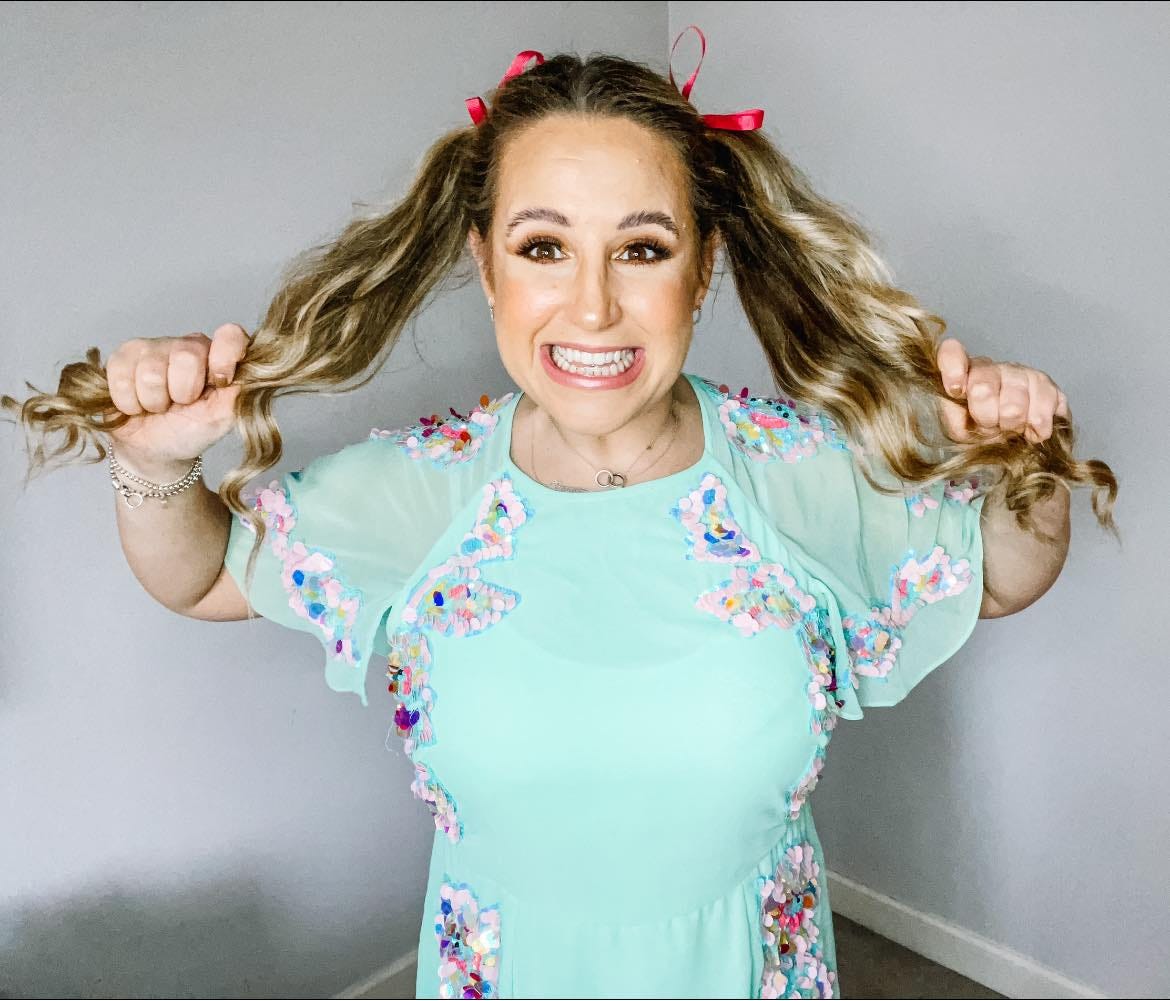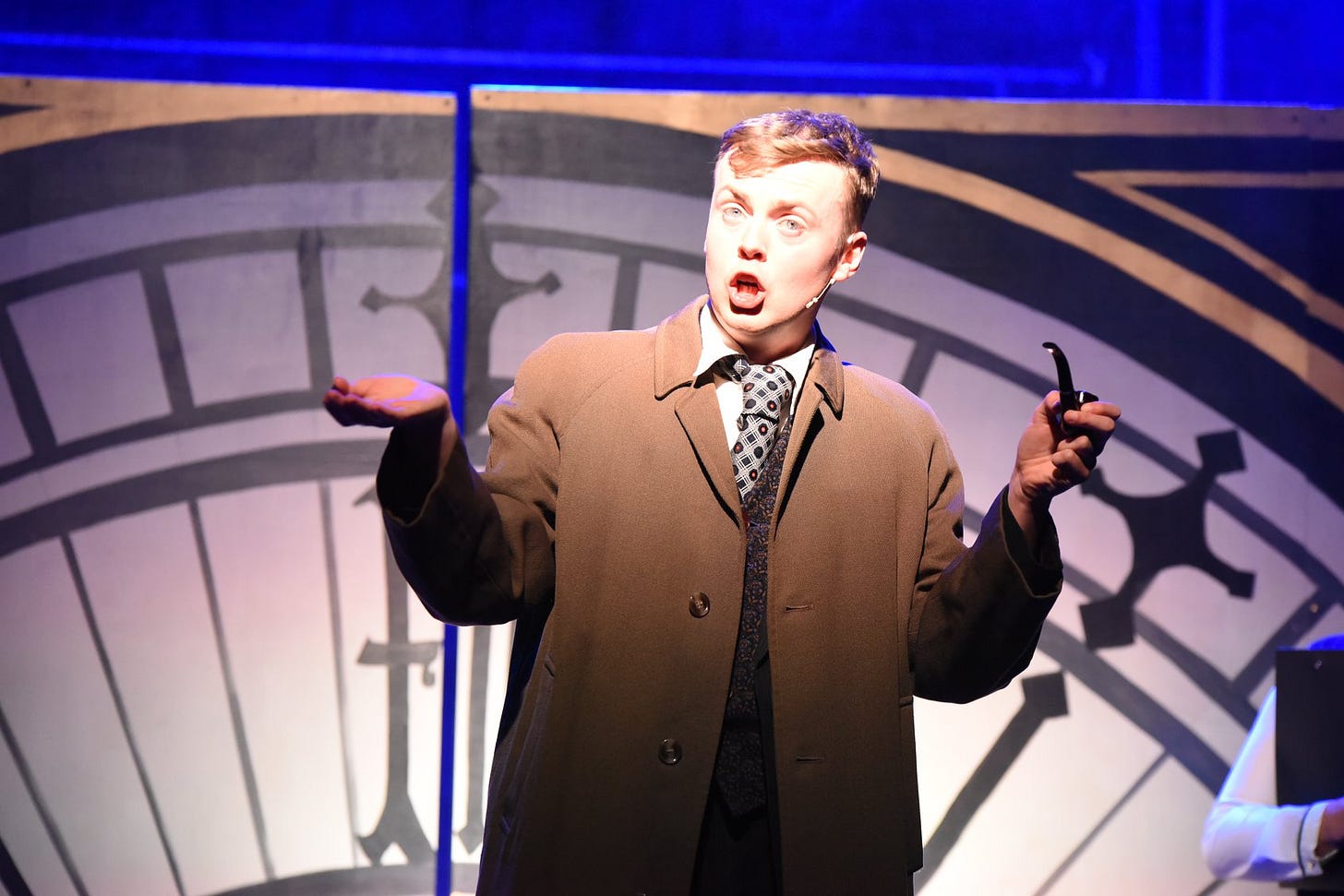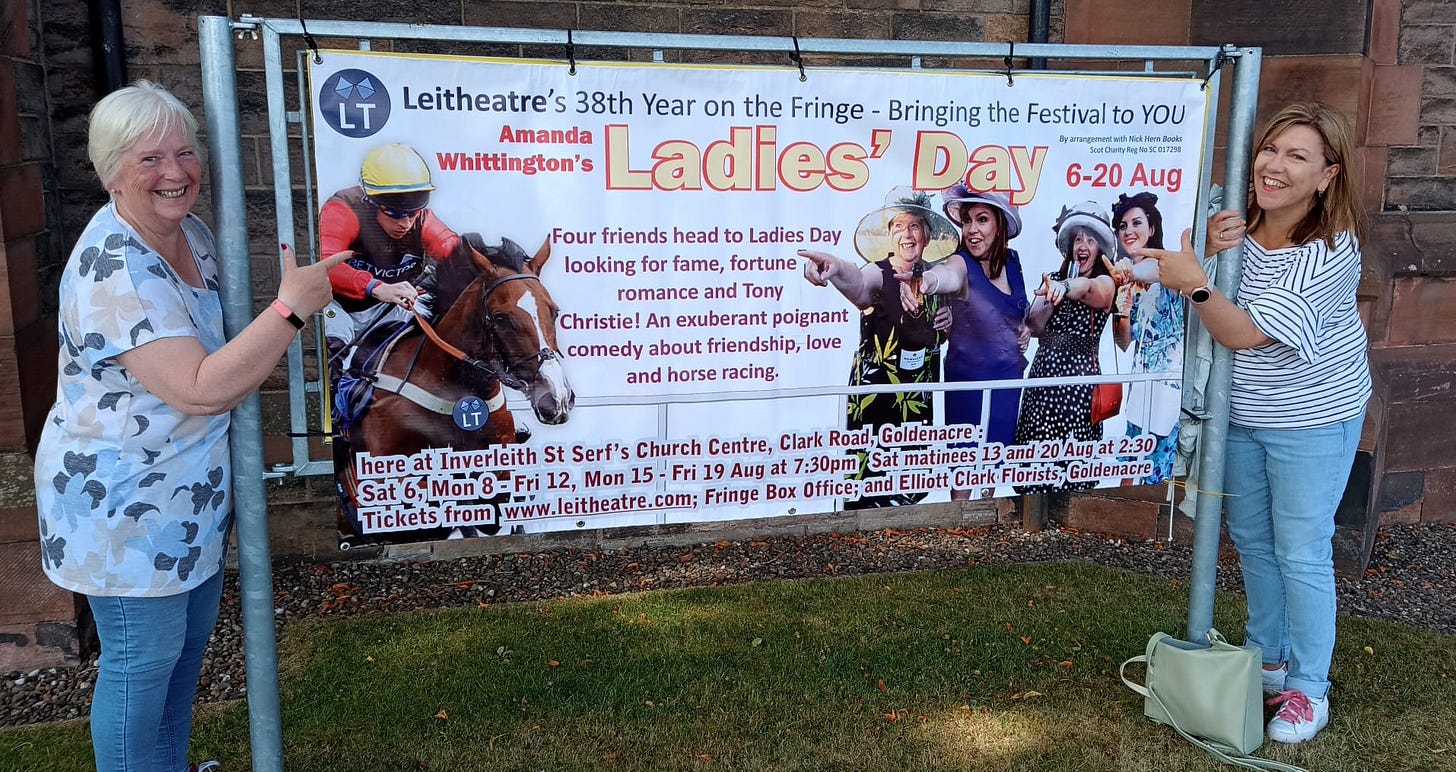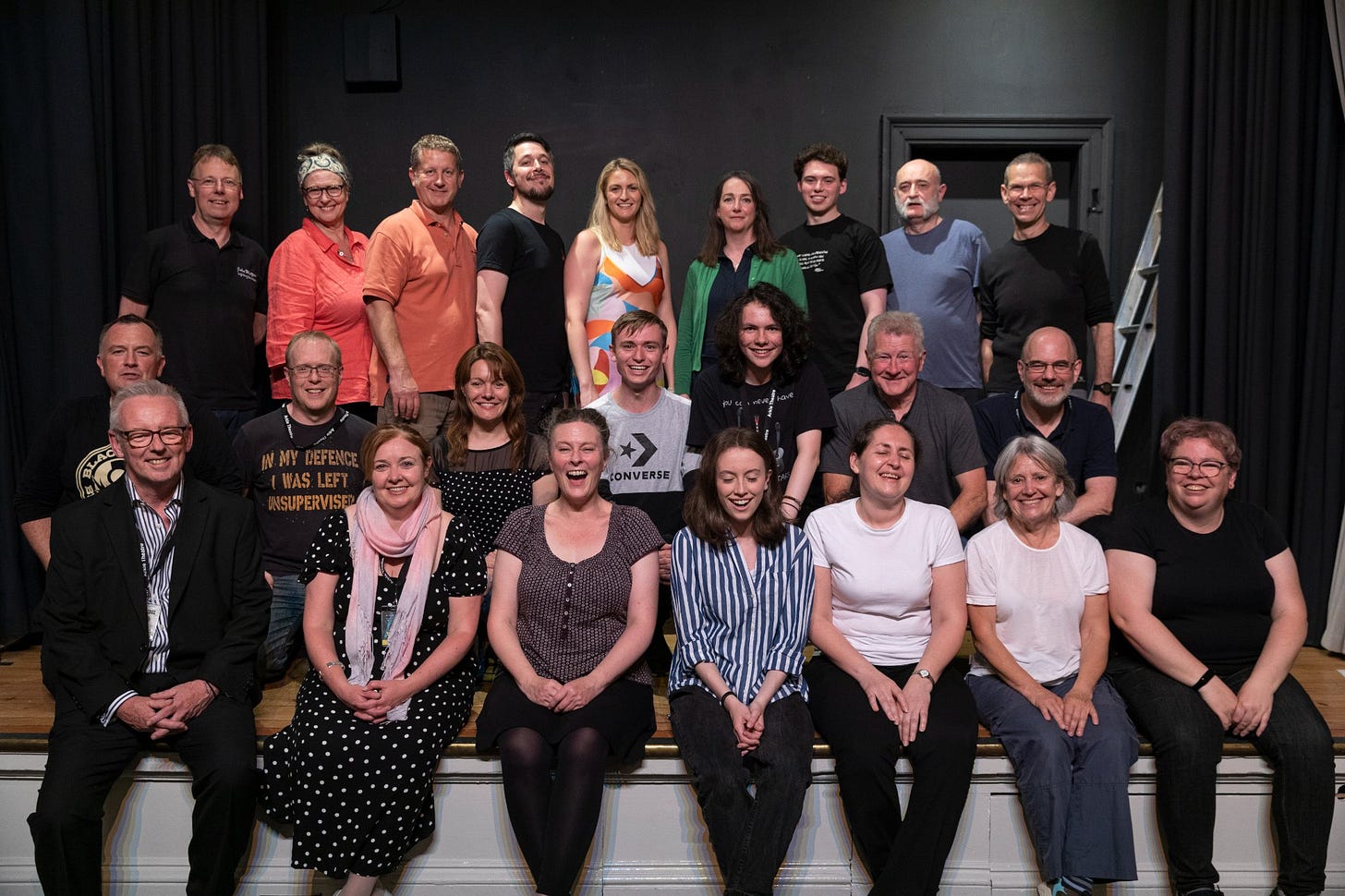It's not amateur theatre, it's just unpaid
The world of Edinburgh's outstanding drama volunteers
“During the Fringe, many audience members don’t realize we’re an amateur company. They’ll ask ‘are you touring this around Scotland?’, and I have to point and say, ‘No, he’s a lawyer and has to be back at work tomorrow’.
“They assume it’s a professional production, and that’s exactly what we aim for. Edinburgh has a lot of talent - for our upcoming production of Accidental Death of an Anarchist we had 21 people audition for six roles. We have amazing actors - some are content with amateur theatre, while others perhaps wish they had pursued professional acting, but now they’re serving coffee.”
That’s Michael Mulligan speaking, the retiring founder of Arkle Theatre, one successful amateur theatre company amongst more than 50 operating throughout Edinburgh, writes Will Quinn.
AM-DRAM, Amateur Dramatics, Community Theatre… back in the mists of time, perhaps you were pulled along to the local church hall to watch an auntie or uncle slip off their day job persona and into character. Maybe it was better than you expected - or not - but I’m sure most of us never darkened the doors of an amateur production again. Reader, that was a mistake.
For if well-intentioned, but old-hat amateur productions can still be found once the Zumba sweat and Yoga mats have been tidied away, other enthusiasts have been busy pushing the boundaries of amateur theatre’s possibilities. For more than a century, Edinburgh’s dramatic amateurs have been establishing companies aiming to match, and in some cases exceed, the standard of work in professional circles.
So allow me to introduce you to a few of the people and companies making theatre magic without professional budgets - or wages - in our fair city.
It’s a lifeline
“It means quite frankly everything,” says Dominic Lewis of Fringe-conquering Bare Productions. “It’s a bit of a lifeline.”
For so many, amateur theatre isn’t just a pastime; it’s a vital creative outlet. It’s a chance to escape the demands of daily life, perhaps explore other talents, or even become someone else for a few precious hours each week.
Lynn Cameron from Edinburgh People's Theatre (EPT) puts it beautifully: “I can honestly say amateur theatre changed my life. It can be all-consuming, but is so very rewarding… and it grows and flourishes into something wonderful.”
It’s a sentiment echoed by Emma Dawson Duthie of musical theatre specialists Allegro: “You really couldn’t do this hobby if you didn’t love it. I wouldn’t have it any other way.” Suffice to say, this isn't a casual interest; it's a deep-seated passion that fuels countless hours of hard work, long after the afternoon rush hour.
Every story has a beginning
How do these theatrical journeys begin? Often, it's a story in itself. Dominic Lewis recounts his own early steps: “I started with AmDram when I was 8. I always knew I loved singing and dancing around the house.” Years of theatre class followed until at 14, he hooked up with CODYS - Cheshire Operatic and Dramatic Youth Society. Four years later, he was on the train up to Edinburgh University, and found Edinburgh Footlights, the student-run musical theatre group.
“I ended up doing a couple more years of theatre productions with uni societies until I was essentially too old for them. I did them a couple of years beyond graduation!” There followed a call-out for a choreographer from Edinburgh’s venerable Bohemians amateur company in 2015, and the birth of his own company, BARE Productions in 2017.
For others, the call to the stage comes later. Lynn Cameron’s experience is a testament to this: “When my sons reached an age they didn’t want to do things with Mum anymore, I joined a beginners’ acting class with Acting Out UK and I was instantly hooked. That would have been 2011 I think. After a couple of terms with Acting Out I wanted to take it further, and found EPT on the internet.”
Alison Kennedy, who joined Leitheatre in 1983, has her own tale: “ I was involved in Blackhall Church drama with a guy called John Archer, who was also part of Leith Theatre. Some people from Leith Theatre came to see a play we did called Wild Goose Chase and the director of the next Leith Theatre play said to John, “Get that girl to read for a part.” That was in 1983.”
For some of these companies, this love has been nurtured even longer. Take Edinburgh People's Theatre, now in its 82nd year. Their enduring presence surely speaks to untiring dedication. “I think it has to be the people that have kept, and continue to keep, it going,” says Lynn Cameron. She speaks with pride of their most senior member: “Our longest-standing member Val Lennie first joined EPT in 1957. The knowledge and experience of our time-honoured members is invaluable to keep the EPT traditions alive, and this combines with the new ideas and fresh outlook of our more recent members. It just seems to work.”
Babes in the Wood
Among Edinburgh’s 50+ amateur companies, there’s an ever-shifting mix of vintage undertakings and bright-eyed upstarts.
Michael Mulligan, a stalwart of the Edinburgh amateur theatre scene long before he helped found Arkle, explains how the venture came about with a clear sense of opportunity for change: “We set up Arkle in 1994, and decided that we would break away from the club system. It had been a very set thing over the years up until then: very old-fashioned, very set.” The model Arkle adopted of open-casting their shows as per the professional sector caught on, and you’ll find it replicated throughout the sector these days.
Looking to their inheritors’, we have Lewis’s BARE productions, which selects the cream of Edinburgh’s amateur crop to triumphant ends every Fringe.
“I discovered all the other wonderful AmDram groups, particularly Allegro,” he says, “and worked in prod teams as well as being in a few shows. I then felt, well, there’s not many companies doing shows in the Fringe - that’s when I set up BARE productions in 2017! I’ve directed shows with them ever since.”
Amateur productions are very well represented at the Fringe now - you may even have been to one and not noticed. “We put 50 seats into our (Fringe) venue,” says Mulligan. “We know we can sell at least that. People complain about not being able to get a ticket, to which I say, ‘try harder next time!’”
Work versus theatre
How do these dedicated individuals juggle their passion with the demands of everyday life? Emma Dawson Duthie paints quite a picture: “For most people, it’s a case of finishing work at 5/6, rushing home to change, have a quick dinner and straight back out to a 3-hour rehearsal.” That’s a tight squeeze and probably understates the sacrifices of time and energy.
Yet, as Susan Duffy of Leitheatre asserts, the rewards are worth it: “One of the things I say to anyone thinking about getting involved is that although it’s tough, it’s the best stress reliever. You can’t think about anything else. It’s mentally helpful, even though it’s tiring.”
Susan’s stage dreams still had to wait until other commitments had expired. “I didn’t manage that balance very well for about 15 years. My work life just took over, and I couldn’t commit as much to theatre as I wanted.” Even now she’s retired, it’s not an insignificant commitment. “I have more time for it now… but it’s still hard for everyone, especially when you're doing a two-week run and you’re rehearsing for a week beforehand - that’s three weeks of commitment.”
Then there are others, like Lynn Cameron, for whom amateur theatre caught her at the right stage in life: “It’s easier for me now that I’m retired, but I was lucky my job was regular weekday hours, and my kids had passed the age where they needed babysitting. My husband is very accommodating.” Move over golf widows…
Amateur - how DARE you!
What about the elephant in the room? The word "amateur." It often carries connotations of being less than professional, but those involved in Edinburgh’s scene are swift to challenge that perception. Dominic Lewis is forthright: “Quite frankly, I’ve seen and been involved with a wealth of shows where the talent and end-product has been better than a lot of professional things I’ve seen on tours. I’ve seen some extraordinary amateur theatre.”
For Michael Mulligan, the term is unacceptable: “I just will not tolerate amateur. There was a chap in England who played Tom Joad for us in the Grapes Of Wrath many years ago - a very good actor. He once said to me, ‘Not amateur actors, professional actors - you're paid or unpaid. Because I have met many amateur actors who are far better than professional actors and I've met many professional actors who were absolutely outstanding. It's a paid or unpaid situation.’”
When Susan Duffy invited ex-colleagues from her time with the Scottish Parliament, she drew the same conclusion. “When I came back to Leith Theatre after a break, I told people at the Scottish Parliament about it, and many of them were hesitant to come. They thought it would be just like the usual amateur dramatics they’d seen before - low budget, low quality. But when they came, they were always really surprised by how good the productions were. We always say the only difference between us and professional theatre is that we don’t get paid!”
Unpaid but professional
Indeed, you’ll find professionalism running through every aspect of Edinburgh’s unpaid theatre industry. Take BARE Productions' approach to their critically acclaimed production of RENT at the 2023 Fringe.
“It was important to us to make the story as authentic as possible. We did a lot of work with Waverley Care, we had speakers in, and ran seminars to deepen the characters. We had chances to do lots of community work - that was very special and very emotional in places.”
Or how about the year-round commitment from Allegro’s board, and the six months of hardcore rehearsals they demand every year? “We kick off in May,” Emma says, “and our show is in late October/November. It’s nearly six months of one three-hour rehearsal a week. For us on the board, we never really stop. We have our first meeting a few weeks after the show to get the ball rolling in the next one.
“I am also in charge of all the marketing for the company so it really can take over your life, but I wouldn’t have it any other way.”
It’s a sentiment Dominic Lewis, who also choreographed Allegro’s stunning 2022 production of Legally Blonde, shares. “Planning is just really important,” he asserts, “I’m a fan of weekly e-mails to the cast with updates, Google drives with resources for people to practice with at home, a good rehearsal schedule so people know where they have to be. Communication also in terms of the cast being able to feed back, and to ensure they are enjoying the process, and how that can be improved, is vital. So those are the three pillars, good vision, good planning and good communication.”
However, despite the best efforts of organising whizzes like Emma, Dominic and Michael, some unpaid thespians take time to find where their strengths lie. Susan Duffy has a perfect example. “I was doing a one-act play in the early '90s, and we had a stage manager who... let's just say, he didn’t get a couple of cues right. I was thinking, “oh, that’s ridiculous!” I couldn’t believe it.
“He wasn’t the most brilliant stage manager, but he turned out to be a pretty good actor. His name was Mark Bonnar.” That’s Mark Bonnar of Shetland, Guilt, and Line of Duty, to name a few of his starring parts since his days with Leiththeatre.
A thin line between professional and amateur
If stories like Mark’s are the exception rather than the rule, the line between the unpaid and paid theatre industries still appears thin. “The line is blurry now,” says Michael Mulligan, “especially given the current state of theatre worldwide. You have to make a living, and it’s tough. Out of the 12 or 15 people who have passed through our group and studied acting, perhaps only three have gone on to make a living from it.”
That’s a familiar story for Susan Duffy: “I wanted to do it professionally when I left university, but I quickly realised I wasn’t prepared for the level of financial insecurity and rejection that comes with it.” Ditto Emma Dawson Duthie, who’d completed a year of professional training at The MGA Academy of Performing Arts, before finding a job in a bar whilst she decided what to do instead of pursuing a career in the theatre. It was “Fate”. “I answered a call from the previous Allegro president wanting to book a space for a quiz,” says Emma. “She told me that Allegro had new member auditions a few weeks later, and 13 years later, the rest is history.”
So the unpaid stage benefits from a steady supply of folks with professional training as well as gifted novices, but there’s always that ‘unpaid’ part.
Non-financial Rewards
For many, it’s the joy of being on stage as with Susan Duffy’s “dream role” as Miss Jean Brodie. “I never thought I’d get to play such a strong, complex character,” she says. “It was so far removed from who I am in real life, which made it all the more exciting.”
The former Head of Engagement and Communications for the Scottish Parliament also found like many other performers it helped her build confidence in her professional life. “Oh, absolutely. I used to have to do a lot of presenting at work, and the confidence from performing on stage definitely helped with that.”
Michael Mulligan, on the other hand, found the opportunity to express himself behind the scenes or more accurately, in building them. “I always wanted to be involved, though not as a performer - I’m no actor. In the mid to late 80s, with my interest in woodworking and practical skills, I joined Edinburgh People’s Theatre (EPT). I assisted a man named Michael Robert “Ron” Wellwood, who was the chief set builder. Old age and ill health caught up with him, and by around 1990 he had to retire. I took over as EPT’s chief set designer and builder, creating five sets a year until the mid-90s.”
Dig a little deeper and you find an explanation for why, for many involved, unpaid theatre is ‘community theatre’.
“It’s an incredible platform to grow in confidence.” explains Lewis, “It’s also easily the best way to make social connections. I think without it, I wouldn’t have had any of the theatre friends I do. I do think theatre folk are a very special kind of folk. People refer to Amateur Theatre as a hobby, but actually it’s a chance to escape from the normal world and normal problems. For one, two, or even three rehearsals a week, you get to live with like-minded people, putting on a show - it’s a bit of a fantasy world.”
For Kevin Edie, this social aspect has been life-defining. “Amateur theatre has been a wonderful way of boosting my confidence and meeting people from all walks of life. Being a member of EPT is the most important thing I have ever done because it was through EPT I met the love of my life and my wife Kelly.”
Tears and laughter
The lines between rehearsal and reality can blur, as Alison Kennedy recalls. “I remember when we were putting on Ladies Day - about four lasses from the Hull fish docks on a day trip to the races. Susan and I were rehearsing our lines while we were out delivering flyers in Trinity. We walked past a garden, and a guy put his head up over the hedge with a raised eyebrow. We had to explain, ‘No, we’re just practising our lines!’ He didn’t believe us.”
And of course, there’s being on stage when ‘the magic’ happens, as Lynn Cameron describes from her time playing a soldier in Blackadder Goes Forth. “In the poignant final scene we had to go “over the top”. We climbed the ladders to a dry-ice-filled stage, with the sound effects of bombs and guns, and then were all shot and died, while a blanket of poppies fell on our heads from above. It felt so real that I was close to tears during every show, thinking about the men who really experienced it in WW1.”
Never go drinking with William Hurt
In 2009, Arkle Theatre were due to stage the The Taming of the Shrew, and had the good fortune to cast one Dougie Arbuckle in it. As luck would have it, his sister was one of the leading makeup artists in the British film industry at the time. “He says she’s working in a movie just now down south, with Russell Crowe as Robin Hood,” Michael recalls. “You won’t believe this, but there’s an actor in it called William Hurt,” I said, “Oscar winner, one of my favourite actors”. He said, “He’s coming up to Edinburgh…and he’s desperate to see Shakespeare.”
Dougie’s sister promptly mentioned the play, and before you know it William Hurt is sitting in on their final performance. “The cast thought we were winding them up. At the end, he spoke to the cast. He said, “I’m not going to say anything about the performance or the direction, but I will give you some hints about physicality on stage.” Afterwards, it was down to the pub where he duly drank the assembled Arkle members under the table. “Never go drinking with William Hurt!”, Michael concludes.
The bottom line
Of course, goodwill and wonderful, life-affirming experiences aren’t a currency with which amateur companies can keep their finances in order. Even if the talent is unwaged, sets, costumes, insurance, and venue fees all require a healthy cash flow. That isn’t getting any easier. “For amateur theatre groups - and I don’t know how professional companies manage - it’s the financial pressures that are most dominant now,” says Michael Mulligan. “Costs like licensing, insurance, and hiring performance spaces - it’s all become punitive.”
As a result, it’s never been more important to put bums on seats. “The biggest challenge facing EPT (and all theatres really)” says Kevin Edie, “is getting an audience. Whereas 50, 40 or even 20 years ago theatre was a fun way to spend the night, competition with TV and on-demand things has led to smaller audiences.”
For some, the answer lies in maximising profits in August. BARE Productions began with a laser focus on Fringe success. For Michael Mulligan and Arkle, it represents a chance to keep taking risks with productions in the other months of the year. “In London’s West End, when a show flops, it’s not just 'too bad' - it can mean £8 million lost. These producers are big gamblers, and some of them don’t succeed. Rob and I, though not wealthy, absorb the losses from Arkle’s spring productions, which are offset by the profits from running the venue during the Fringe.
“Amateur theatre groups manage to get by, with some good years and some bad. They have the freedom to do challenging work - not necessarily avant-garde, but stripped-down, focused on the actors and the story.”
Maybe no one’s being paid in amateur productions, but there’s little difference in the challenges of keeping these companies alive from their professional counterparts.
There might even be practical benefits to being unpaid. Where their paid counterparts are trapped, in the main, with purpose-built theatres with huge running costs, Michael Mulligan, for example, sees far more versatility for ambitious amateur operators.
“When I attend Fringe roadshows, I often tell people: find your own venue and take control of it. That’s what Rob and I did after spending two years performing in other people’s spaces in the mid-90s. There are many spaces that can be made to work with a bit of effort - it can be quite simple. Our very first show was in a church hall next to St. George’s, which has since been demolished, and then we moved to St. Stephen’s, which had terrible acoustics.
“After that, we took over a church to perform Shakespeare, then moved to the Sheraton Hotel, then to Mayfield, and we’ve been here since 2009. When we were looking at the Sheraton, I asked, “What space do you have available during the Fringe?” They said nothing was booked because there are no weddings in August. So they gave us a huge function suite at a low cost - we used half as a dressing room and half as the theatre.”
That’s right, the five-star Sheraton said yes to amateur theatre at the height of the tourist season.
Think it’s all draughty halls, think again…
Indeed, nowadays you’ll find most of the prominent Edinburgh amateur groups staging big shows - outside of August when the Edinburgh International Festival moves in - at the Church Hill Theatre in Morningside, or the Festival Theatre. You might think the council, which owns the Church Hill might make some allowances, but Festival Theatre-owners Capital Theatres aren’t switching the lights on for dodgy productions or flimsy audiences. Don’t trust a critic like me when I say that amateurs are producing theatrical gold? Fine, trust the accountants.
But in the end, the 100’s of Edinburghers currently involved in unpaid theatre aren’t there for financial rewards. Breaking even, or turning a profit, is just a means to staging the next performance.
I’ll leave the last words to Allegro’s Emma Dawson Duthie. “I’ve 13 years of memories and every show brings new ones with it. We’ve had everything on stage from broken ankles mid-dance routine, props malfunctioning spectacularly and people not being on stage when they should have been. We’ve also had amazing moments like standing ovations on opening nights, and incredible reviews… but for me personally, I love it when I’m watching my friends just shine on stage being the stars that they are.
“As for memorable backstage moments, I’ll keep them between me and the Allegro members…”
Will Quinn is Editor of the Quinntessential Review





